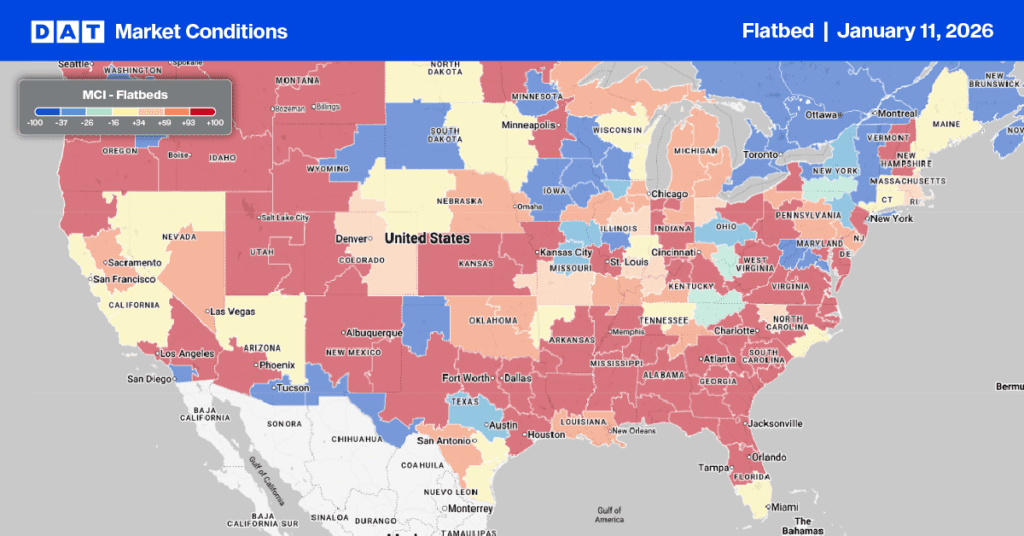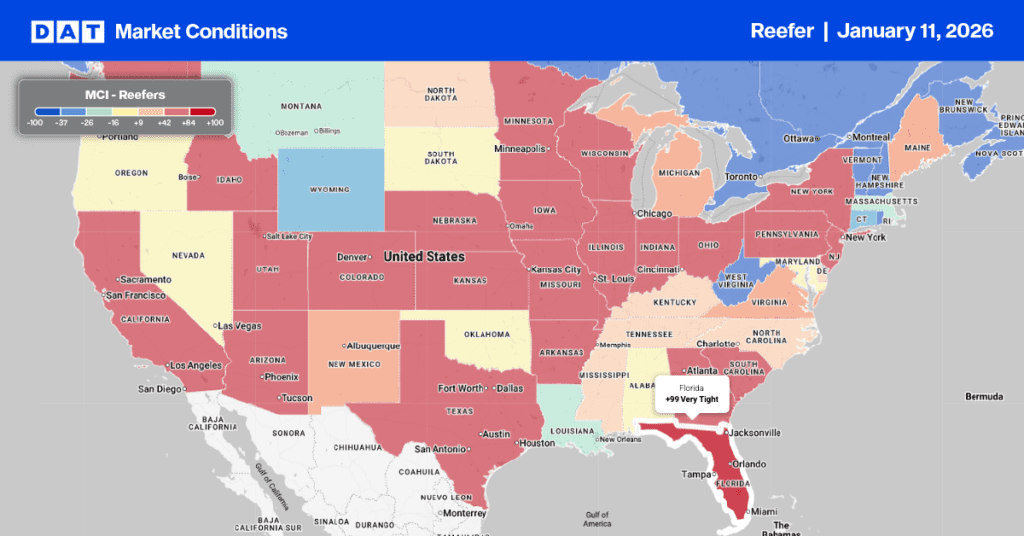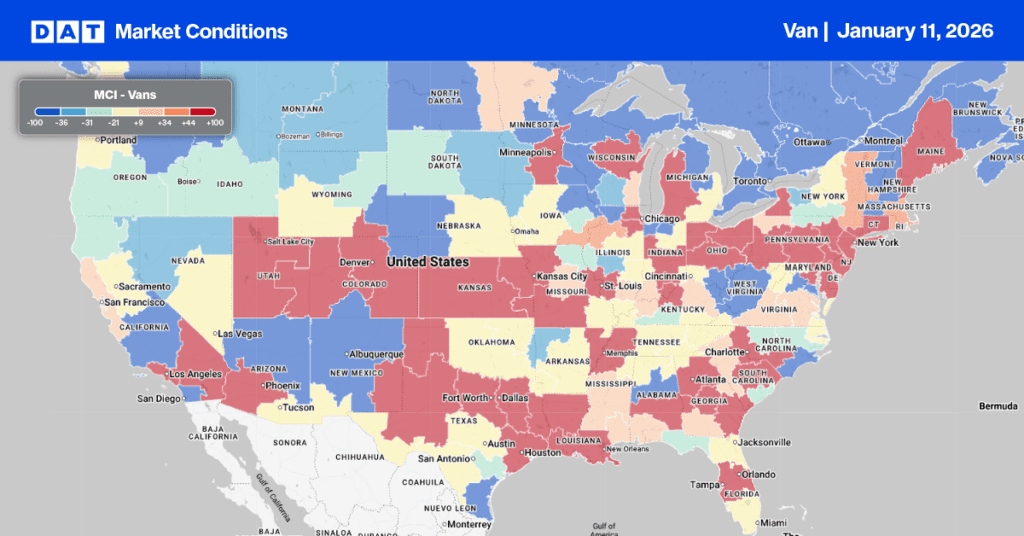Vehicle rental and leasing company TIP is trialing a new e-reefer refrigerated trailer solution on roads in the United Kingdom (UK). Supplied by the Reefer Trailer Centre, this Chereau trailer has an axle energy recovery system developed by Thermo King and BPW. The system features an axle power energy recovery mechanism with an e-Power axle, which can recover energy while the vehicle brakes or travels downhill. This recovered energy is then stored in a battery, allowing an intelligent energy management system to determine whether to use power from the battery or generators to maximize efficiency.
Get the clearest, most accurate view of the truckload marketplace with data from DAT iQ.
Tune into DAT iQ Live, live on YouTube or LinkedIn, 10am ET every Tuesday.
For reefer carriers interested in reducing their carbon footprint through future technologies, the axle energy recuperation system, co-developed by Thermo King and BPW, provides power to the refrigeration unit when needed. In addition, half-width sliding bulkheads inside the trailer allow temperature control in a smaller area when transporting partial loads. It also includes vacuum insulation panels and uses HFO foam. To minimize energy loss, the evaporator automatically turns off when the rear door is opened, and a solid front evaporator protector prevents waste or product from entering it.
Market watch
All rates cited below exclude fuel surcharges, and load volume refers to loads moved unless otherwise noted.
This week, we focus on produce markets in Florida, which are still reeling from the one-two punch from Hurricanes Helen and Milton. Following Hurricane Helene’s devastating strike in Florida’s Big Bend on September 27, Hurricane Milton landed almost two weeks later on October 9, further exacerbating the state’s challenges. Milton, the second Category 5 hurricane of the season, came ashore as a Category 3 near Siesta Key, Florida, and pummeled Central Florida with catastrophic rain, storm surge, and 100 mph wind gusts. The storm resulted in widespread flooding, tornadoes, and power outages, causing severe damage across Florida’s agricultural regions, resulting in late October truckload produce dropping 84% compared to the same time last year.
Damage assessments are still underway, and according to early reports, nursery, citrus, tomato, and strawberry crops have been impacted. Florida is the second-largest producer of strawberries in the U.S., generating over $430 million annually across more than 12,000 acres. Approximately 99% of Florida’s strawberry acreage was right in the path of Hurricane Milton. When the storm hit, many strawberry operations had just planted or were about to plant strawberry transplants. Typically planted between September and November, strawberries are harvested starting in December and continue to produce fruit through the spring.
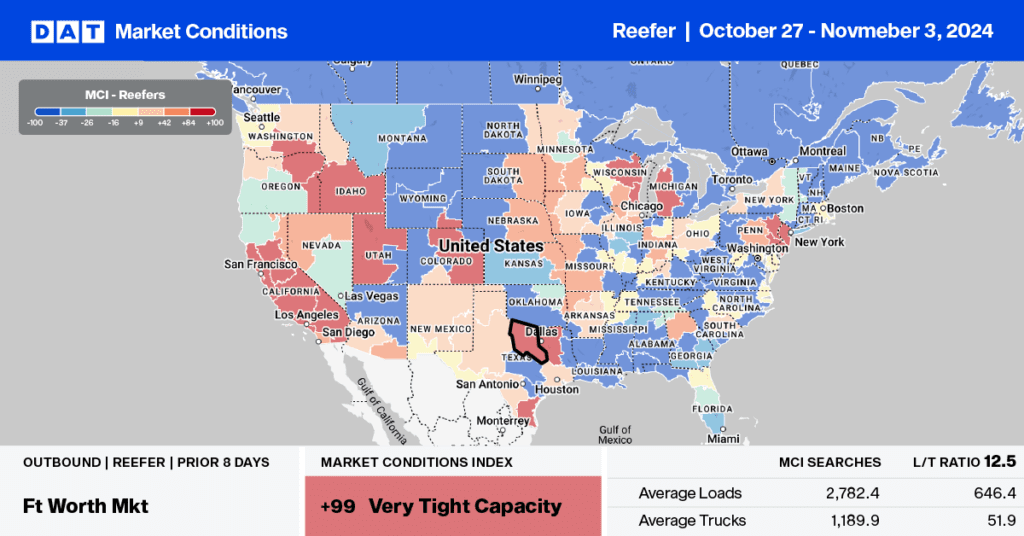
Load-to-Truck Ratio
National reefer load postings rose by 3% last week, though they were still 13% lower than the levels seen last year and the average over the previous eight years, excluding the pandemic years of 2021 and 2022. Meanwhile, postings for carrier equipment dropped by 14% week over week, leading to a 20% increase in the reefer load-to-truck ratio (LTR), which currently stands at 6.39.
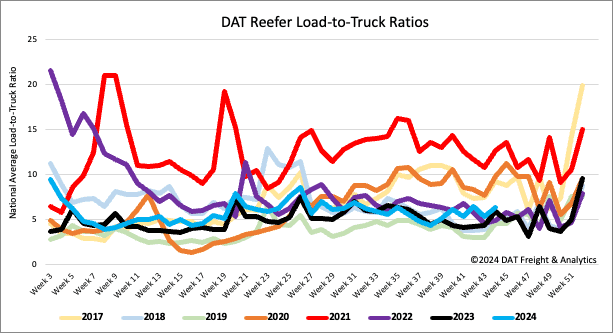
Spot rates
Even though the volume of loads moved was flat last week, reefer capacity tightened following a $0.04/mile jump in spot rates. Carriers were paid an average of $2.02/mile last week, which is $0.11 per mile higher than last year. Reefer linehaul rates are around $0.04/mile higher than the three-month trailing average.
Of note was the shortage of trucks in Nogales, AZ, for Mexican produce imports, resulting in outbound rates jumping by 10% week-over-week (w/w) on a 25% increase in load volume. As expected, last week’s Diwali Festival in California resulted in tighter capacity as drivers took time off to celebrate the Festival of Lights. California outbound spot rates increased 4% w/w on a 5% lower volume.

